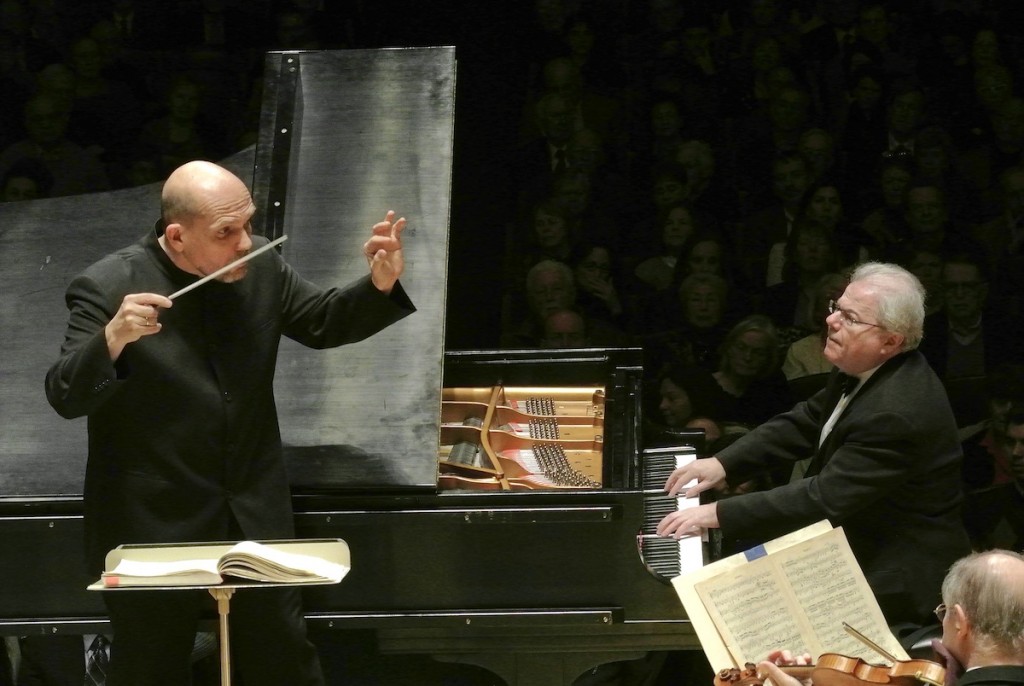Van Zweden, Ax strike sparks with BSO for lively Beethoven and Rachmaninoff

Emanuel Ax performed Beethoven's Piano Concerto No. 2 with Jaap van Zweden and the Boston Symphony Orchestra Wednesday night at Symphony Hall. Photo: Stu Rosner
Two second-tier works by first-rate composers received rewarding outings at Wednesday night’s concert of the Boston Symphony Orchestra, thanks to the talents of conductor Jaap van Zweden, in his BSO subscription debut, and piano soloist Emanuel Ax.
While neither Beethoven’s Second Piano Concerto nor Rachmaninoff’s Second Symphony is blessed with its composer’s best material—Beethoven acknowledged as much when offering the concerto for publication in 1798– a lot of musical pleasure can be wrung out of both works by players of skill and imagination, as Wednesday’s performances demonstrated.
The least often performed of Beethoven’s five published piano concertos, No. 2 in B-flat major, Op. 19, occupied the composer for eight years off and on, as he performed it, adjusted it, and eventually replaced its entire finale. Although it’s customary to cite Mozart as the model for Beethoven’s early concertos, van Zweden gave this work’s orchestral exposition a distinctly Haydn-like character, with a vertical beat that made the short phrases sit up straight and talk to each other. Boston is an early-music town, and van Zweden seemed to play to that taste with his fleet tempos and transparent, period-orchestra textures.
Soloist Ax responded in kind, with playing that emphasized clarity and articulation over the Mozartean “flow like oil” style, reserving his buttery legato for special effects. Ax’s voicing of chords and contrapuntal passages gave particular pleasure, with a shining top tone that effortlessly projected every nuance of phrasing to the furthest seat in the hall. And plenty of nuances there were, thanks to Ax’s ever-present sense of the music’s direction.
Between Ax’s modest demeanor at the keyboard and Beethoven’s rather symphonic conception of the work (especially in the Adagio), a listener was more conscious of the orchestra’s contribution than usual in a concerto performance. In fact, soloist and orchestra seemed to collaborate as if playing chamber music, a fact acknowledged at the end of the performance, when Ax spoke to van Zweden, and the conductor turned around and got the orchestra up to share the first bow.
The lush nostalgia of Rachmaninoff might seem worlds away from the ambitious young Beethoven, but van Zweden brought a taste for fast tempos and transparent sound to the symphony as well as the concerto. As with Chopin, a Rachmaninoff performance can benefit greatly from a touch of class(icism). It illuminates the music’s fine workmanship and keeps the texture from becoming too thick. But one needs also to step back and allow some breathing room for this composer’s broad, arching melodies, and this van Zweden did less well.
Some of the blame must go to Rachmaninoff, who for much of this long piece has the listener asking: Where is he going with this? In the first movement, the modulating sequences march up the hill and down again, over and over, but to what purpose? Even the famous opening melody of the Adagio is not so much a great tune as a great hook for a tune that never arrives, so that the movement sounds like all development and no theme, a metaphor not for eroticism but erotic frustration.
It is a rare performance that can find (or concoct) a narrative thread through this material, and that didn’t happen here. But on a moment-to-moment basis, van Zweden and the orchestra kept things lively and colorful, so no longueurs crept in over the piece’s fifty minutes or so. Most effective was the Allegro molto scherzo, which, after a bit of a helter-skelter start, locked onto Rachmaninoff’s rat-a-tat rhythm for a scintillating performance.
The orchestra also responded like a thoroughbred to van Zweden’s whip in the finale, with the shrieking strings giving the theme a frantic edge—a defensible interpretation, given that Rachmaninoff and Shostakovich were both 20th-century Russian composers. But here again, the second theme needed more room to bloom, especially since it is not the lushest flower on this composer’s “big tune” plant.
The program will be repeated 8 p.m. Thursday, 1:30 p.m. Friday and 8 p.m. Saturday. bso.org; 617-266-1492.
Posted in Performances
Posted Feb 10, 2012 at 11:39 am by Matt
Do you know what the encore Ax played after the Beethoven concerto?
Posted Feb 10, 2012 at 1:41 pm by patricia mcdonough
Van Zweden’s whip made the orchestra perform at their hightest level on
Thursday evening. Too bad he will be in Hong Kong for the next 4 yrs.
We could have used him permanently.
I have been a season subscriber for over twenty-five years and have heard many conductors work here but Van Zweden is one of the finest to grace the podium.
Posted Feb 14, 2012 at 3:20 pm by Robert Fix
Jaap Van Zweden is still the Music Director of the Dallas Symphony Orchestra and will not be permanently in Hong Kong.